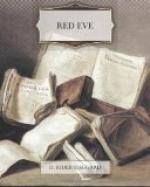“It must have been a mighty arm that shot this arrow, Sir Hugh,” he said reflectively, “which could pierce a casque of Milan steel from side to side and a hardwood post beyond. Well for the owner of the helm that his head was not inside of it.”
“Very well, and a very mighty arm, David. So mighty that I should say nothing about it for fear lest it should set another arrow upon another string and shoot again.”
“God’s truth, not I!” exclaimed David, “and for your comfort, sir, know that none saw us leave this house or reenter it last night.”
Then Hugh and Dick clothed themselves and saw to their weapons and mail, but this they did not don as yet, fearing lest the weight of it should weary them in that great heat. Although the day was so young, this heat was terrible, more oppressive indeed than any they had yet known in Venice.
When they were ready David left them to see to the horse which de Cressi would ride in his combat with Cattrina. Hugh, as became a God-fearing knight whom Sir Andrew Arnold had instructed from childhood, crossed himself, knelt down and said his prayers, which that morning were long and earnest. Indeed he would have confessed himself also if he could, only there was no priest at hand who knew his language, Sir Geoffrey’s chaplain being away. After watching him a while even Grey Dick, whose prayers were few, followed his example, kneeling in front of his bow as though it were an image that he worshipped. When they had risen again, he said:
“You grieve that there is none to shrive us, master, but I hold otherwise, since when it was told what company we kept last night absolution might be lacking. This would weigh on you if not on me, who, after what I have learned of Father Nicholas and others, love but one priest, and he far away.”
“Yet it is well to have the blessings of Holy Church ere such a business as ours, Dick; that is, if it can be come by.”
“Mayhap, master. But for my part I am content with that of Murgh, which he gave us, you may remember, or so I understood him. Moreover, did he not teach that he and all are but ministers of Him above? Therefore I go straight to the head of the stair,” and he nodded toward the sky. “I am content to skip all those steps which are called priests and altars and popes and saints and such-like folk, living or dead. If Murgh’s wisdom be true, as I think, these are but garnishings to the dish which can well be spared by the hungry soul.”
“That may be,” Hugh answered dubiously, for his faith in such matters was that of his time. “Yet were I you, Dick, I’d not preach that philosophy too loud lest the priests and popes should have something to say to it. The saints also, for aught I know, since I have always heard that they love not to be left out of our account with heaven.”
“Well, if so,” answered Dick, “I’ll quote St. Murgh to them, who is a very fitting patron for an archer.” Then once again he glanced at the helm and the arrow with something not unlike fear in his cold eye.




